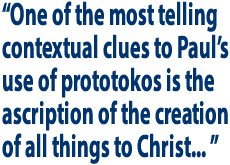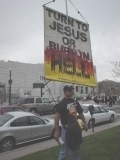“As concerning therefore the eating of those things that are offered in sacrifice unto idols, we know that an idol is nothing in the world, and that there is none other God but one. For though there be that are called gods, whether in heaven or in earth, (as there be gods many, and lords many,) But to us there is but one God, the Father, of whom are all things, and we in him; and one Lord Jesus Christ, by whom are all things, and we by him.” (1 Corinthians 8:4-6).
The above passage opens a discussion by the Apostle Paul on the sensitive topic of behavior among believers, and the matter of each person’s conscience. He is answering a question that must have been included in a letter sent to him by the congregation at Corinth. Idols were a very common sight in Corinth, as in most ancient cities of the time. Some of the believers, having been involved in idol worship, could not with a clear conscience partake of meat that they knew had been sacrificed to idols. This was a serious problem, as just about every bit of the meat supply in the city may have been involved in such practices.
Paul addresses the problem by first saying that idols “are nothing in the world.” An idol has no power over the Christian. It has no reality other than the demonic power that would cause someone to worship it. There was no real Diana, or Jupiter, or any of the other false gods of the era. He then puts forth the fact that though things or people may be called gods, to the Christian there is only one God, the Father, and one Lord, Jesus Christ (obviously connecting them in a supernatural way.) In the process, Paul says that “there are gods many and lords many.” Obviously what he meant by this is that there are many false gods and false lords being worshiped by non-believers, but these are simply idols. One can make a god out of almost anything – as one person put it, some people get up in the morning and shave their god in the mirror, others get into their god and drive to work, others sit in front of their god for hours each night and watch it.
The fact that Paul is alluding to false gods is brought out more clearly in more modern translations:
“For even if there are so-called gods whether in heaven or on earth, as indeed there are many gods and many lords,…”(New American Standard Bible)
“For even if there are so-called gods, whether in in heaven or on earth (as indeed there are many “gods” and many “lords),…” (New International Version)
The Bible clearly says that “all the gods of the peoples are idols, but the LORD made the heavens.” (Psalm 96:5). In context, then, Paul is not saying that he believed in polytheism, the belief in many gods, but rather that he was a monotheist – he believed in only one God.
In light of the clear Biblical position on this, it is amazing to read the words of the Mormon “prophet” Joseph Smith in regards to this verse: “You know and I testify that Paul had no allusion to the heathen gods. I have it from God, and get over it if you can. I have a witness of the Holy Ghost, and a testimony that Paul had no allusion to the heathen gods in the text.” (Teachings of the Prophet Joseph Smith by Joseph Fielding Smith, page 371.) Which would you rather believe – God’s Word, or a false prophet?





